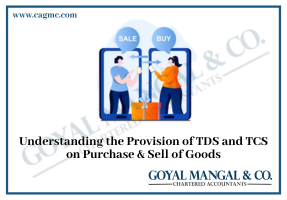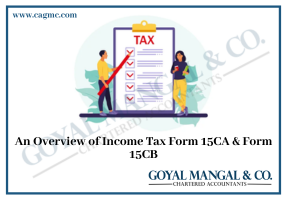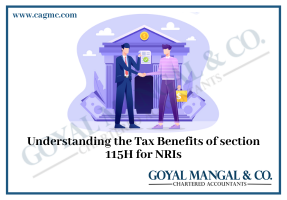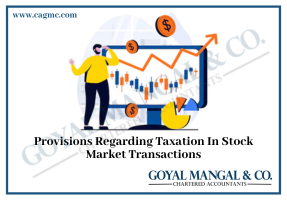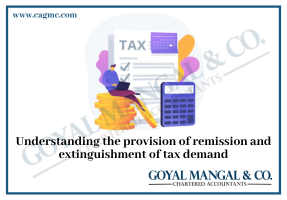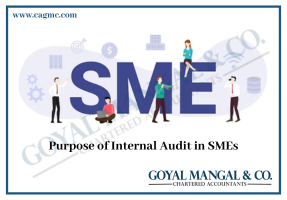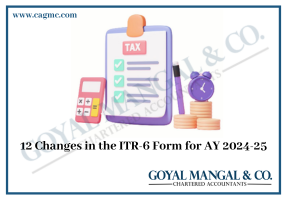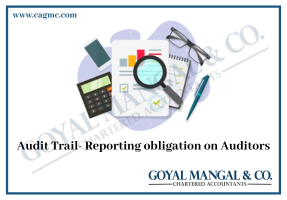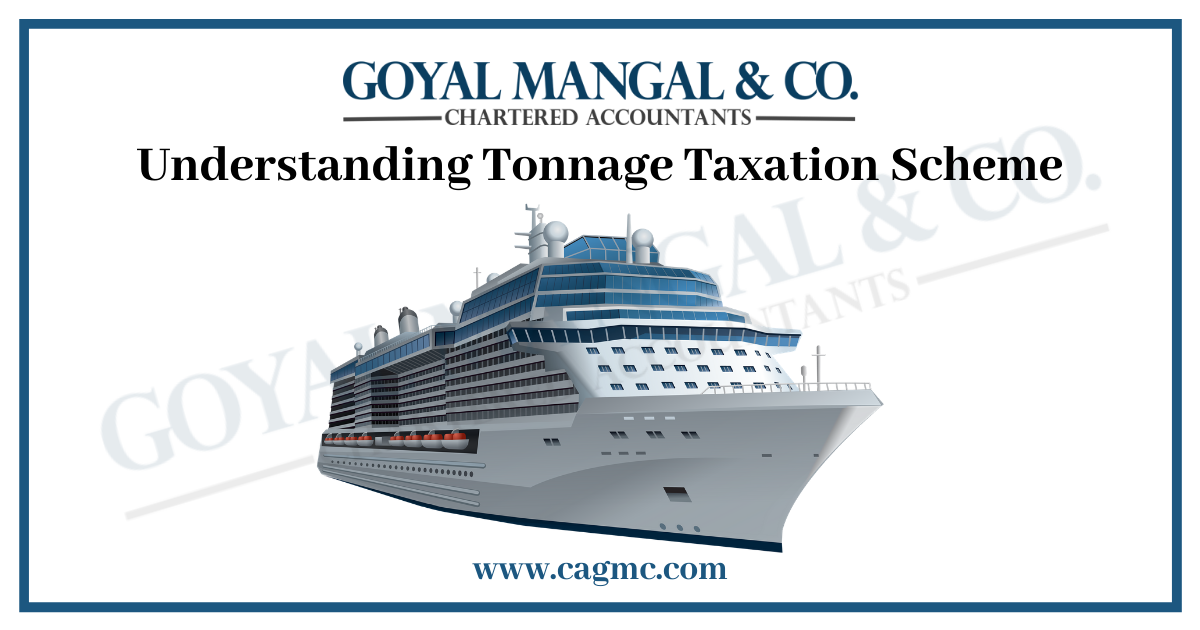
A tonnage tax is a taxation mechanism that can be applied to shipping companies. In this method, the tax is determined by the net tonnage of the entire line of operating vehicles or use by a company. Tonnage tax is not a tax but somewhat a method for ascertaining taxable income.
Using this scheme, the taxable income is computed as a lump sum depending on the size (net tonnage) of the ship, independent of the actual income (profit or loss).
Section 115VC: What is a Qualifying company?
A company is said to be a qualifying company for Tonnage taxation if:

*POEM (Place of Effective Management) is a place where key management and commercial decisions are necessary for the conduct of the business or where the board of directors regularly approves the commercial and strategic decisions made by the executive directors or officers of the company, the place where such executive directors or officers of the company perform their functions, of an entity. A set of guiding principles to determine POEM has been issued by CBDT.
Qualifying Ships
- Sea-going ship or vessel having Net tonnage equal to or more than 15.
- Ship registered under Merchant Shipping Act or Licensed obtained from DGS.
Following are exclusions from Qualifying Ships –
- a sea-going ship or vessel if the foremost purpose for which it is used is the provisions of goods or services of a kind usually given on land;
- fishing vessel;
- factory Ship means a ship rendering processing services in respect of fishing produce;
- pleasure craft means a ship whose main use is for sport and recreation;
- harbor and river ferries;
- offshore installations;
- a qualifying ship used as a fishing vessel for more than thirty days during a previous year.
Section 115 VE: Manner of Computation of Income under Tonnage Tax Scheme
- The business of operating qualifying ships shall be regarded as a separate business separate from all other activities or business carried on by the company.
- The profit from tonnage business shall be calculated separately from the profit and gains from any other business and shall be taxable under the head “Profit and gain of Business or Profession”.
Section 115 VG: Computation of Tonnage Income
- The tonnage income of every qualifying ship shall be the daily tonnage income of each such qualifying ship multiplying it by-
- the number of the day in the previous year; or
- the number of days in part of the previous year in case the ship is operated by the company as a qualifying ship for only part of the previous year, as the case may be.
- The daily tonnage income of a qualifying ship having tonnage referred in column (1)of the table below shall be the amount specified in the corresponding entry in column (2) of the table;
Qualifying ship having Net tonnage Amount of daily tonnage Income to be taken (1) (2) Up to 1000 Rs 70 for each 100 tons Exceeding 1000 but not exceeding 10000 Rs 700 + Rs 53 for each 100 tons in excess of 1000 tons Exceeding 10000 but not more than 25000 Rs 5,470 + Rs 42 for each 100 tons in excess of 10000 tons Exceeding 25000 Rs 11,770 + Rs 29 for each 100 tons exceeding 25000 tons - The tonnage shall mean the tonnage of a ship indicated in the certificate issued under the Merchant Shipping Act, 1958.
- The tonnage shall be rounded off to the nearest multiple of hundred tons and for this purpose; any tonnage consisting of kilograms shall be ignored.
Despite anything held in any other provision of this Act, no deduction or set-off shall be allowed in computing the tonnage income under this chapter.
Section 115 VL: General Exclusion of Deduction and Set-off, etc.
Despite anything contained in any other provision of this Act, in computing the tonnage income of tonnage tax company for Relevant previous year in which it is chargeable to tax under this chapter –
- Section 30 to 43B shall be applicable as if every loss, allowance, or deduction referred to therein and relating to or allowable for any of the relevant previous year, had been given full effect for that previous year itself;
- no loss referred to in section 70 or section 71 or section 72 or section 72A, in so far as such loss links to the business of operating qualifying ships of the company, shall be carried forwarded or set-off where such loss relates to any of the previous years when the company under the tonnage tax scheme;
- no deduction shall be allowed under Chapter VI-A linked to the profit and gain from the business of operating qualifying ship; and
- in computing the depreciation allowances under section 32, the written down value of any assets used for the tonnage tax business shall be computed believing that the company has claimed and has been granted the deduction in respect of depreciation for the relevant previous years.
Section 115VM: Exclusion of Loss
Section 72 (Carry forward and set off of business losses) shall apply in respect of any losses that have accrued to a company before its opting for tonnage tax scheme and which are attributable to its tonnage tax business as if such losses had been set off against the related shipping income in any previous year when the company is under the tonnage tax scheme.
Section 115JB: Exclusion from the provision of MAT
The book profit or loss that arose from the activities of a tonnage tax company, from the qualifying ships, shall be eliminated from the book profit of the company for section 115JB.
Section 115VQ: Period for which tonnage tax option can be taken
- An option for tonnage tax scheme after the approval shall apply for a period of ten years from the date on which such option has been used and shall be taken into account from the assessment year relevant to the previous year in which such option is implemented.
- An option for tonnage scheme shall discontinue affecting the assessment year relevant to the previous year in which-
- the qualifying company cease to be qualifying company;
- default is made in complying with the provision regarding the transfer of profit to Tonnage Tax Reserve Account and minimum training requirement for tonnage company;
- the qualifying company provides the Assessing officer, a declaration in writing stating that the provision of this chapter may not apply to it;
- the tonnage tax company is suspended from the tonnage tax scheme under section 115VZC.
So, the profit and gain of the company derived from the business of operating qualifying ships are computed under the other provisions of this Act.
Section 115VT: Transfer of profit to Tonnage Tax Reserve Account
An amount not less than 20% (percent) of the book profit reaped from the business of qualifying ships shall be credited to the Tonnage Tax Reserve Account.
Further, it is required to keep a note that the amount credited to the Tonnage Tax Reserve Account shall be used by the company before the expiry of a period of next eight years following the previous year in which the amount was credited-
- for acquiring a new ship for the business of the company; and
- until the acquisition of a new ship, for the business of operating qualifying ships other than for distribution by way of dividends or profits or remittance outside India as profits or the formulation of any asset outside India.
Section 115VU: Minimum Training requirement for Tonnage Tax Company.
A tonnage tax company shall comply with the minimum training requirement specified by the Director-General of Shipping and notified in the official Gazette by the Central Government.
If the minimum training requirement is not exercised for any five consecutive previous years, the option of the company for tonnage tax scheme shall discontinue having effect from the start of the previous year following the fifth consecutive previous year in which the failure to comply with the minimum training requirement had happened.
Section 115VZB: Avoidance of Tax
- The tonnage tax scheme shall not apply where a tonnage tax company by way of any transaction or arrangement tries to misuse the tonnage tax scheme.
- A transaction or arrangement shall be considered a misuse if the entering into or the application of such transaction or arrangement result or resulted, in a tax advantage being gained for-
- a person other than tonnage company; or
- a tonnage tax company in respect of its non-tonnage tax activities.
Section 115VZC: Exclusion from Tonnage Scheme
- Where a tonnage tax company is a party to any transaction or arrangement referred to in section 115VZB (Operating ships.), the Assessing Officer shall, by an order in writing exclude such company from the tonnage tax scheme.
- An opportunity shall be given by the Assessing Officer to the assessee by serving a notice calling upon such company to show cause on a date and time as specified in the notice that why it should not be removed from the tonnage tax scheme
- Also, no order shall be passed without the previous approval of the Principal Chief Commissioner/Chief Commissioner.
- However, this section shall not apply where the company satisfies the Assessing Officer that the transaction was a legitimate commercial transaction and had not been entered into to obtain a tax advantage.
- Where an order is passed by the Assessing Officer excluding the tonnage tax company from the tonnage tax scheme, the option for tonnage tax scheme shall discontinue being in force from the first day of the previous year in which the transaction was entered.
Conclusion
The Government has launched the Tonnage Tax System for taxation of income obtained from shipping activities by an Indian Company. This Scheme is optional for a qualifying Indian shipping company like you can opt for it if you think it suits you. After satisfying some conditions a company is qualified to enter under the scheme. A company is required to have at least one qualifying ship to be eligible for Tonnage Tax Scheme, and that the business of the qualifying ship has to be managed as a separate business. Separate accounts must be kept for the same.
Many of us have doubts regarding tonnage tax scheme that is why this article is here for better understanding of this scheme of taxation
